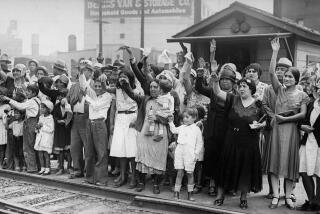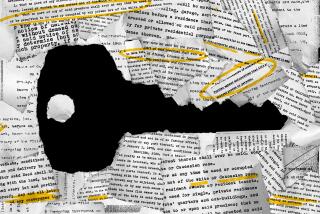Chinese Exclusion Act Tied to Fears and Protectionism : History: Archivists assemble reminders of bias and suffering linked with laws enforced from 1882 to 1943.
PHILADELPHIA â Jack Moy was 13 when he and his mother sailed from China to the United States--only to be rounded up with hundreds of other immigrants, plucked from a Seattle dock and deposited in a detention center.
They spent the next month there, mother and son separated from one another and in the company of strangers.
âIt was like a prison where a child grew up real fast,â he said recently, recalling his first memories of America in 1927. âWe were lucky; we were released in a month. Others were detained for years and some committed suicide while imprisoned.â
Moy, now 81, a retired Philadelphia merchant, was one of thousands of Chinese immigrants and Chinese-Americans targeted by the Chinese Exclusion Acts, federal laws enforced from 1882 to 1943 to curtail the movement of Chinese in and out of the country.
The immigrantsâ suffering under the laws comes to life in 350,000 files containing postcards, letters, telegrams, photographs, certificates, transcripts, passports and arrest warrants saved by the Immigration and Naturalization Service.
Archivists at National Archives offices in Philadelphia, New York City, Seattle, Los Angeles and San Francisco are using the records to develop a computerized system to simplify genealogical and academic research.
The National Archives office in New York is scheduled to be the first to transfer its files into the new system this month.
The records show American immigration officials interrogated people arriving from China with insulting personal questions and demanded excruciatingly precise responses.
Does your mother have bound feet? How many homes are located in your native village? How many windows are in each room of your home?
Often, stuttered responses resulted in deportation.
âThe acts grew out of fear and protectionism and itâs hardly mentioned in American history lessons,â said Betty Lee Sung, professor emeritus of history at the City College of New York and author of several books about the Chinese experience in the United States.
Sung hopes the archiving project will help exhume and rewrite a buried part of American history.
âWhen Congress passed the Chinese exclusion laws they thought it would protect American homes, American lives and American jobs,â said Marian Smith, a historian at the INS. âInstead, it placed a social and psychological burden on Chinese-Americans.â
Merchants, students, teachers and tourists were the only Chinese welcomed to the United States under the exclusion acts; laborers were barred.
All applicants had to submit testimony from witnesses verifying their identities, and merchants were required to have Caucasian witnesses confirm their financial status. The requirements even applied to American citizens returning to the country.
âEven people who were biracial were still considered to be âChinamen,â â Sung said. âAs long as they had one-eighth part of Chinese blood they were considered âChinamen.â The same rule applied to American-born Chinese.â
The discriminatory treatment resulting from the laws should give pause to future legislative decisions, Smith said.
âIt is a good example of the long-term ramifications any piece of legislation can have on any group,â she said.
More to Read
Sign up for Essential California
The most important California stories and recommendations in your inbox every morning.
You may occasionally receive promotional content from the Los Angeles Times.





![[20060326 (LA/A20) -- STATING THE CASE: Marchers organized by unions, religious organizations and immigrants rights groups carry signs and chant in downtown L.A. "People are really upset that all the work they do, everything that they give to this nation, is ignored," said Angelica Salas of the Coalition of Humane Immigrant Rights. -- PHOTOGRAPHER: Photographs by Gina Ferazzi The Los Angeles Times] *** [Ferazzi, Gina -- - 109170.ME.0325.rights.12.GMF- Gina Ferazzi/Los Angeles Times - Thousands of protesters march to city hall in downtown Los Angeles Saturday, March 25, 2006. They are protesting against House-passed HR 4437, an anti-immigration bill that opponents say will criminalize millions of immigrant families and anyone who comes into contact with them.]](https://ca-times.brightspotcdn.com/dims4/default/34f403d/2147483647/strip/true/crop/1983x1322+109+0/resize/840x560!/quality/75/?url=https%3A%2F%2Fcalifornia-times-brightspot.s3.amazonaws.com%2Fzbk%2Fdamlat_images%2FLA%2FLA_PHOTO_ARCHIVE%2FSDOCS%2854%29%2Fkx3lslnc.JPG)




